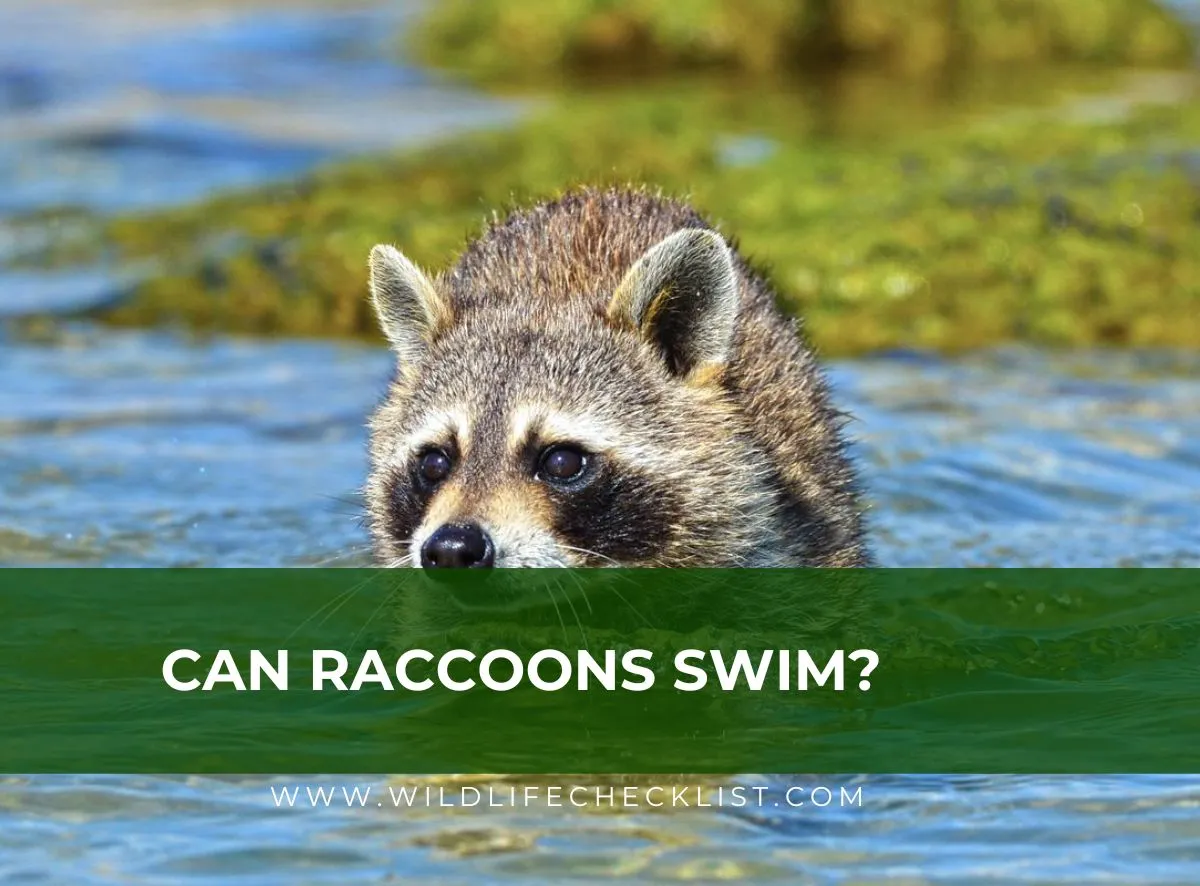Can Raccoons Swim? (How to keep Them Away From Your Swimming Pool)

Raccoons are known to be wild animals living on the ground and are known to be very stubborn. They are not typically aquatic animals but are known to be water lovers. But here is one thing, can raccoons swim?
Yes, Raccoons can swim. However, they are not water animals. They are known to live on trees or dry ground, but they can enter water and swim. They do their swimming majorly in pools or ponds, and they always have the intention to do so.
Though by nature, they love to stay around lakes and rivers, and this is because they know they will get some food. We can say Raccoons are good fish harvesters because they have a great way of harvesting fish in ponds. So, because of their reasons for entering the water, they mostly invade ponds to search for food.
Contents
Do Raccoons Like Water?
Raccoons surely like water because you can see them hanging around swimming pools, rivers, ponds, and water. By nature, raccoons prefer to stay near lakes and rivers.
They have amazing fishing skills and swoop up fish and other sea creatures with paws. It is important for homeowners who have fish ponds to always take caution if they have raccoons around their yards.
Some raccoons use the fish they catch as food, so it is better to have a preventive measure for your ponds. Ensure you cover your ponds with a cover or use a strong fence to keep the raccoons away. Raccoons are good swimmers but cannot stay long inside water.
How Good Are Raccoons at Swimming?
How long can a raccoon swim? Raccoons have been reported to be able to swim 5 km per hour on average. Also, they can remain in the water for so many hours. They are always known to enter swimming pools in private buildings and can stay in the pool without anyone noticing them.
According to another theory, raccoons are thought to be apprehensive in the water due to their weight. Their body weight can be as much as 2 lbs, and they lack the physical features to stabilize themselves in flowing water.
You will want to ask, do raccoons like to swim? They don’t like to swim, as they are not aquatic animals, but when raccoons enter the water, they don’t do so intentionally. They do these mainly because they want to catch fish and other sea animals, and sometimes when chasing predators.
Raccoons can quickly attach themselves to objects they find within the streams, like tree branches and rocks. Doing this allows them to find their way out of the water easily.
Can Raccoons Swim Fast?
According to estimates, a raccoon can swim for 3 to 8 hours on average at 3 meters per hour or 5 kilometers per hour. They can swim as fast as 15 meters per hour which is 25 kilometers per hour, to escape predators. Raccoons love to swim and majorly interact with them through their natural behavior.
One of the interesting things they need water for is to wash their food before eating. You will usually find them around water, where they can catch fish and use it for dinner. They also use the water to feed themselves, but their ability to swim has given them an edge over their predators.
Do Raccoons Swim Under Water?
Raccoons can swim under the water to a depth of around 5 feet, as we’ve already mentioned. They have a breathing mechanism developed to survive underwater with little or no oxygen. They can do this for several minutes, unlike humans, who can hardly survive without oxygen for over 1 minute.
Raccoons have a skin structure that comprises more than 85% of coats or fur. This makes it easy for animals to swim even during extreme cold weather.
They use their skin as an insulator during their temporary hibernating periods and use the extra fat stored during summer and spring. Raccoons can swim in water for a long time but cannot live inside water.
Can You Drown Raccoon?
You can drown Raccoons. And it is one of the ways to kill them, but it is an inhumane thing. This is done by ensuring raccoons are caught using a trap cage submerged in water, a lake, or a pool. After the mammal has been trapped in such water, it can die through that means.
There are differently designed cages with a small water tank beneath, and the lower portion of the cage opens up as soon as the raccoon steps onto it and dies by drowning. Another method is to use the same technique, replace the water with carbon dioxide, or use a lethal injection.
How To keep Raccoons Away From Your Swimming Pool
House owners with fish ponds must find a way to stop raccoons’ invasion. This is because any invasion of raccoons around a pond is to swoop up some fish for their food, which is a loss to the fish owners.
Also, raccoons usually pick places or locations to defecate, and a pool is part of their favorite location. In pools, raccoons love to defecate in shallow areas, like the steps, which will contaminate the pool. Here are various ways to keep raccoons away from your pool, and you can try the same technique with your ponds.
- Ensure you cover the pool area that raccoons have visited.
- Always make sure the fence around the pool or pond is closed
- Inquire to know if someone is feeding raccoons in your area. Ensure they don’t keep their feeds outside or pet food; they should not leave their trash bin uncovered. All these behaviors could attract raccoons to your area and even your pool or pond.
- You can contact wildlife professionals or pest control removal services to help you relocate the animals.
Raccoons can crawl, and they can stand in water as well. Their claws make it easier to grab any animal in the water, even at an incredible speed. Both female and male raccoons are great swimmers and can swim faster. They find it challenging to move near water during the winter season because that is when they hibernate temporarily.
If you are asked can raccoons swim, you should be able to give an affirmative answer to that. A raccoon can vary with habitat, and most raccoons found in urban areas have bodies that can withstand strong water torrents, mostly during swimming.




